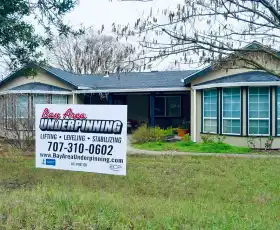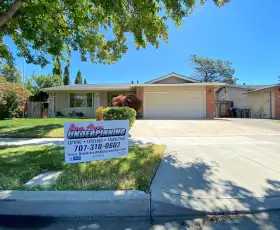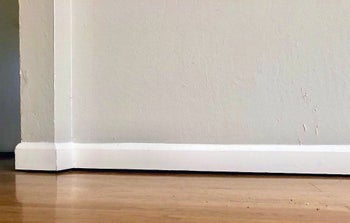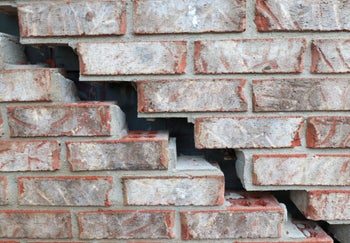Buying A House With Foundation Issues: Read This Before You Sign
Table of Contents
1. Some Good News About Buying A House With Foundation Issues
2. Always Inspect Before You Buy
3. Foundation Issues: Causes, Common Problems, Repair Methods, And Cost
4. Common Causes Of Foundation Problems
5. Signs You Might Be Buying A House With Foundation Issues
Some Good News About Buying A House With Foundation Issues
Thinking about buying a house with foundation issues? Here’s some good news: Foundation issues don’t necessarily mean you need to walk away from a home you’re interested in buying. However, you should exercise caution and not rush into a sale.
This article will discuss the necessity of inspections (and who should perform them), common foundation problems and their causes, residential foundation repair (including cost), signs you might have a foundation problem, and more.
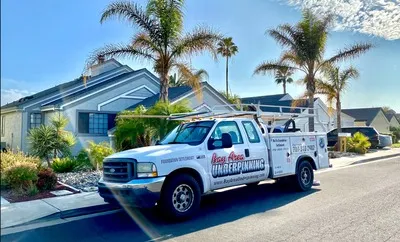
Always Inspect Before You Buy
Before you sign anything, ask an experienced foundation repair contractor or a structural engineer to inspect the house. While foundations are the most critical feature of any structure – including residential homes – problems with them aren’t always easy to spot.
In virtually all US states, the seller needs to disclose any foundation problems. However, that doesn’t mean you should automatically trust what the seller says. Ask a foundation repair contractor to perform an inspection. If there’s damage to the foundation, they’ll find it and let you know how much it will cost to fix. You can then figure the repair cost into your offer.
The inspection process: How does a foundation repair contractor or structural engineer perform a foundation inspection?
At Bay Area Underpinning, we start a foundation inspection by asking the customer if they have any specific areas of concern. (If the customer already owns the home, they’re usually worried about something specific. However, if the customer is buying a house they might not have anything specific in mind.)
The next thing we do is use drafting paper to layout the house. Once the layout is complete we begin taking elevations of the property using something called a Zip Level. We also photograph any signs of foundation issues such as exterior or interior cracks, sloping floors, foundation wall cracks, deteriorating posts, screw jacks, etc.
If it’s a crawl space foundation we get under the house to inspect the condition and number of posts under the sub floor. We look to see if the screw jacks have corroded, if any posts are failing, etc. We also look for foundation cracks, both inside and outside the house.
We aren’t always looking for obvious damage to the foundation. This is what home inspectors look for. Most of our work is leveling, which is not visible when looking at the foundation.
When people hear “foundation issues” they probably most often think of foundation cracks. Foundation cracks are often troublesome, but in most cases they are harmless. Houses built in the 1950s and later are likely to have rebar reinforcement in the foundation. Houses built earlier than the 1950’s are less likely to have rebar reinforcement, and cracks in these older foundations are more worrisome.
A typical inspection takes 45 minutes to an hour. This includes designing the job and then explaining it to the homeowner, which takes an additional 15-45 minutes. The entire process usually takes no more than hour an a half.
Foundation Issues: Causes, Common Problems, Repair Methods, And Cost
The following will give you a general idea about the types of problems you’re most likely to encounter when looking for a home, possible causes, repair methods, and repair price. Keep in mind that this is a very general overview. The cost could vary considerably depending on your geographical area.
Common Causes Of Foundation Problems
- Soil not adequately compacted before construction – Soil that hasn’t been sufficiently compacted before construction will compact after construction and could cause differential settlement.
- Expansive soil – This is soil that expands when it absorbs moisture and then shrinks by that same amount when it dries out. This swelling-shrinking cycle causes movement in the ground, which can, over time, cause foundation damage.
- Drainage problems – Believe it or not, most foundation problems are caused by water. When there’s too much of it in the soil around your foundation, it can cause problems.
- Weather changes – A home built during the dry season on top of expansive soil will experience foundation movement when the wet season comes around again, and the soil expands.
- Heavy excavation next to the foundation – Digging a hole too close to a chair will eventually cause the chair to fall into the hole. Something similar can happen when there’s heavy excavation next to a foundation. While the house probably won’t fall into the hole, the digging could damage the foundation.
- Natural disasters such as earthquakes, floods, and sinkholes
Signs You Might Be Buying A House With Foundation Issues
Signs the house you’re thinking of buying might have foundation issues include,
- Windows and doors that don’t open and close properly – If this is happening with just one window or door, it might not be a foundation problem. However, multiple windows and doors that aren’t opening and closing correctly are signs there might be an issue with the foundation.
- Sloped, uneven floors
- Ceilings and floors that are no longer attached to the walls – Even slight separations could indicate a foundation issue.
- Cracked floors – If the damage is limited to one or two tiles, it was probably caused when something was dropped on the floor. However, a crack that runs from wall to wall is a sign of foundation movement and that could mean damage.
- Cracked walls without or without bowing – The cracks might be on the inside or the outside of a home.
- Torn wallpaper – Torn wallpaper could be a sign that the wall behind the wallpaper is cracked.
- Diagonal cracks from the corners of windows and doors up toward the ceiling
- Moldings that are no longer attached to the walls and/or ceilings
- Stairstep cracks in brickwork
- A leaning chimney or porch
If you’re thinking about buying a house with foundation issues, be sure you get an inspection before you sign on the dotted line. If you’re in our service area in northern California, contact us today.
More Resources
Publish Date:
Last Modified Date:

Our Locations
2333 Courage Dr. Suite C
Fairfield, CA 94533
1161 N Fair Oaks Ave
Sunnyvale, CA 94089

